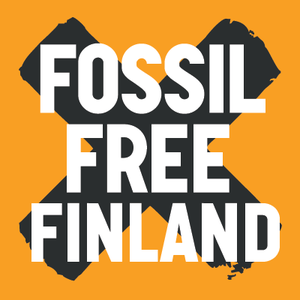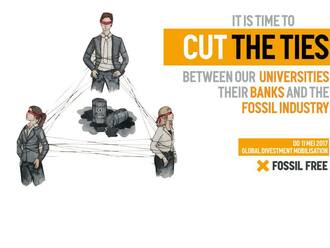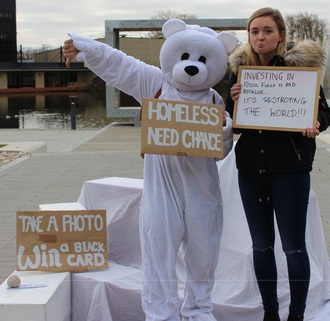-
Université Catholique de Louvain - désinvestissons !Nous sommes aujourd'hui face à un défi tant pour l'humanité que pour le reste de la vie telle que nous la connaissons. Il s'agit d'un défi à la fois terrifiant (car les enjeux sont gigantesques) et formidable, car si nous réussissons la transformation de notre société celle-ci peut véritablement mener à une révolution dans notre manière de vivre et de penser pour aller vers un monde plus juste, plus beau, meilleur. Il est temps de montrer par tous les signaux possibles que les alternatives existent, et qu'il faut créer une nouvelle économie, qui ne sera pas synonyme de moins de bien-être, bien au contraire. Désinvestir des énergies fossiles c'est tourner le dos à un passé destructeur et ouvrir les bras à un avenir où le travail sert à construire, pas à détruire ! Les arguments pour le désinvestissement sont éthiques, scientifiques et économiques. -> Le réchauffement climatique est causé par l'homme et il est nécessaire d'agir pour le limiter au seuil maximum fixé de 2°C (voire même de 1.5°C) afin d'éviter des conséquences catastrophiques dont nous pouvons dès à présent percevoir les premiers effets. En tant que pays développés, notre responsabilité est majeure. -> Arrêter d'investir dans les énergies fossiles ne va pas affecter la rentabilité des placements. Bien au contraire, puisque l'on parle de plus en plus de la « bulle carbone ». En effet, si l'on veut respecter l'Accord de Paris de 2015 (selon lequel le seuil maximal de réchauffement ne doit pas dépasser les 2°C), il sera nécessaire de laisser 80 % des réserves des énergies fossiles sous terre, alors même que celles-ci ont été découvertes, et la plupart du temps achetées par des organismes dans lesquels des personnes/ institutions ont investi. -> Les énergies renouvelables sont de plus en plus compétitives et aujourd'hui investir dans un portfolio sans énergies fossiles ne rapporte pas moins qu’avec. -> L'UCL a un rôle en tant qu'institution publique et nous, en tant qu'étudiant.e.s, mais surtout en tant que citoyen.ne.s, nous avons le devoir d'interpeller nos dirigeants, et dans le cas présent le Conseil d’Administration de l'UCL, sur la situation de dépendance dans laquelle nous nous sommes englués depuis trop longtemps vis à vis de ces énergies polluantes.144 of 200 SignaturesCreated by Louise Peltier
-
Aalto University: Get Our Money Out of Fossil Fuels!Miksi tämä on tärkeää? Yliopistoilla on moraalinen vastuu yhteiskunnan korkeimman tiedon lähteinä hyödyntää omassa toiminnassaan parasta olemassa olevaa tietoa. Tiedeyhteisön yhteisymmärrys on kiistaton. Emme voi polttaa edes puolta maailmanlaajuisista fossiilisten polttoaineiden tunnetuista varannoista aiheuttamatta tuhoisaa ilmaston lämpenemistä. [3][4][5][6] Ilmastotieteilijät ovat yhtä mieltä siitä, että fossiilisten polttoaineiden käyttö on suurin yksittäinen syy antropogeeniseen eli ihmisen toiminnan aiheuttamaan ilmastonmuutokseen, joka aiheuttaa äärimmäisen vakavia ekologisia ja sosiaalisia katastrofeja. [3] Yliopiston tulisi johtaa omalla esimerkillään ilmastonmuutoksen hillitsemistä harjoittamalla entistä kestävämpää sijoitustoimintaa niin ympäristön kuin taloudenkin kannalta. Hiilikuplalla tarkoitetaan fossiilisia polttoaineita tuottaviin yhtiöihin liittyvää taloudellista riskiä, joka johtuu alihintaisten kasvihuonekaasupäästöjen aiheuttamasta markkinahäiriöstä. Hiilikupla on saanut useita sijoittajia vetämään sijoituksensa pois näistä yhtiöistä. [7][8] Yliopiston siirtyminen fossiilisten polttoaineiden tuottajista vapaaseen sijoitusstrategiaan olisi vahva signaali yliopiston henkilökunnalle ja opiskelijoille siitä, että yliopiston johto tunnustaa tieteellisen tutkimustyön tulokset ja pyrkii kehittämään yliopiston toimintaa entistä kestävämmäksi. Divestointi lähettäisi vahvan signaalin niin yliopiston henkilökunnalle kuin nykyisille ja tuleville opiskelijoille, että yliopisto tukee kestävän yhteiskunnan syntymistä. Se olisi tapa olla yksi niistä yliopistoista, jotka ”uskaltavat rohkeasti tutkia ja kokeilla uutta.” Se myös tekisi Aalto-yliopiston investoinnit yliopiston vision mukaiseksi, joka ”sitouttaa meidät rakentamaan kestävälle kehitykselle perustuvaa […] yhteiskuntaa.” Aalto-yliopiston arvoja ovat ”rohkeus vaikuttaa”, ”vapaus olla luova ja kriittinen”, ”vastuu”, ja ”eettisyys”. [2] Lisäksi ”Aalto-yliopisto on sitoutunut noudattamaan vastuullisen sijoittamisen periaatteita.” [9] Aallolla on sijoituksia 900 miljoonan euron arvosta ja se, että osa investoinneista on fossiilisten polttoaineiden tuotannossa, on täysin yliopiston sitoumusten vastaista. Yhteiskunta tarvitsee edelläkävijöitä, jotka luovat uuden normaalin ja motivoivat muita osallistumaan uusien parhaiden käytäntöjen omaksumiseen. ------------------------------------------------------ Why is this important? Universities have the moral responsibility to act according to the leading sources of scientific research and education in a society. The scientific consensus is clear and overwhelming; we cannot safely burn even half of the world's fossil-fuel reserves without dangerously warming the planet for several thousand years. [2][3][4][5] Scientists agree that global warming caused by humans burning fossil fuels will continue to accelerate and intensify tragic climate disasters [3]. As this threat rises, the term carbon bubble was created to describe the financial risk related to companies holding fossil fuel reserves as governments move to fix the market failure caused by uncontrolled carbon emissions [6][7][8]. Aalto University should take the lead in confronting climate change by promoting sustainable and financially sound asset management practises. Divestment would send a strong signal to the University's staff as well as current and future students, that the University will take action for a sustainable future. It would be a way for Aalto University to be part of the “Successful universities [...] who dare to explore and experiment in new, creatives ways”. It will also fully align the investment practices with the principles of Aalto University, which “carries a strong commitment to building a sustainable society" and which values include " Courage to influence”, “Freedom to be creative and critical”, “Responsibility”, and "Integrity".[2] “Aalto University is committed to complying with the principles for responsible investment.” [9] Aalto has over 900 million euros to invest [10], and the fact that part of it is invested in fossil fuel industry is in total contradiction with this commitment! [1] http://gofossilfree.org/companies/ [2]http://www.aalto.fi/en/midcom-serveattachmentguid-1e5ffcbea81c566ffcb11e5957e815724da913a913a/aalto-yliopisto_strategy_english.pdf [3] http://www.ipcc.ch/pdf/assessment-report/ar5/wg1/WGIAR5_SPM_brochure_en.pdf [4] http://carbontracker.live.kiln.it/index.html?CMP=twt_gu [5] http://climate.nasa.gov/scientific-consensus [6] http://climate.nasa.gov/vital-signs/carbon-dioxide/ [7] http://gofossilfree.org/endorsements/ [8] http://www.carbontracker.org/report/carbon-bubble/ [9]http://www.aalto.fi/en/midcom-serveattachmentguid-1e5f0e46065260cf0e411e58c514bbedbeb29782978/aalto_university_annual_report_2015_final.pdf [10]http://www.aalto.fi/en/current/news/2016-02-05/189 of 200 SignaturesCreated by Maja Ilievska
-
Lets Make IIT Fossil Fuel Free!Climate change is accelerating and requires our generation to engineer new ways to combat the time-sensitive issue. As a university, we invest in fossil fuel companies solely for monetary gain. However, we need to move away from this traditional method and start investing in green companies who will provide a similar financial incentive, create more jobs, as well as push for cleaner energies. Having more partnerships with these companies will not only benefit the environment but also provide students more career opportunities to participate in the future of building a more sustainable world. #TechYeah!218 of 300 SignaturesCreated by Brandon Simons
-
UvA - Time to Cut the Ties with Deutsche Bank!The University of Amsterdam wants to be a sustainable University yet they still bank with Deutsche Bank. The University is deciding on their sustainable plans for the upcoming years and ethical banking should be included in this. Deutsche Bank is one of the world’s largest financiers of the coal industry and thus undermining climate finance. Given the commitments made by 195 nations in the Paris agreements to lower greenhouse gas emissions and pursue efforts to limit the global average temperature from rising more than 1.5°C, it is clear that business as usual in financing fossil fuel energy must radically shift. Universities play a significant role in public support for the fossil industry. Given the University of Amsterdam's it is time to clean up their wallet and either urge Deutsche Bank to cut the ties with the fossil industry or move their money away from Deutsche altogether. We invite students, student organizations, employees and teachers to come by and 'cut the ties' between the University of Amsterdam, their bank and the fossil industry on . And sign the petition!252 of 300 SignaturesCreated by Lena Hartog
-
Let's renew the Politecnico di Milano - stop fossil fuels!We want that our university, the most important eningeering university in Italy, to focus (during our education) most on renewable energy, not only on fossil fuels energy. Now the biggest part of the education program is based on "traditional" sources of energy, such as gas and coal. We need to teach to the future of our Country the importance of the renewable energy! As signed in Paris in 2015, we MUST change our vision of energy for the future. We ask to the Politecnico di Milano to increase the time and the quality of the renewabe energy teaching. We are the future, and we demand to teach the future in our university. Climate change is accelerating. We are witnessing the increasing impacts of a warming planet more and more consistently; in this last year alone our country experienced record-breaking heat, droughts, and hurricanes, which impacted hundreds of thousands of people and cost our country hundreds of billions of dollars. Hurricane Sandy alone caused $50 billion in damages. Experts agree that global warming caused by humans burning fossil fuels will continue to accelerate and intensify these tragic climate disasters. The scientific consensus is clear and overwhelming; we cannot safely burn even half of global fossil-fuel reserves without dangerously warming the planet for several thousand years.155 of 200 SignaturesCreated by Michele Argenta
-
Divest NEC from Fossil Fuels!Climate change is accelerating. We are witnessing the increasing impacts of a warming planet more and more consistently; in this last year alone our country experienced record-breaking heat, droughts, and hurricanes, which impacted hundreds of thousands of people and cost our country hundreds of billions of dollars. Hurricane Sandy alone caused $50 billion in damages. Experts agree that global warming caused by humans burning fossil fuels will continue to accelerate and intensify these tragic climate disasters. The scientific consensus is clear and overwhelming; we cannot safely burn even half of global fossil-fuel reserves without dangerously warming the planet for several thousand years.313 of 400 SignaturesCreated by Stephanie Goulet
-
Divest Willamette University From Fossil FuelsClimate change is accelerating. We are witnessing the increasing impacts of a warming planet more and more consistently; in this last year alone our country experienced record-breaking heat, droughts, and hurricanes, which impacted hundreds of thousands of people and cost our country hundreds of billions of dollars. Hurricane Sandy alone caused $50 billion in damages. Experts agree that global warming caused by humans burning fossil fuels will continue to accelerate and intensify these tragic climate disasters. The scientific consensus is clear and overwhelming; we cannot safely burn even half of global fossil-fuel reserves without dangerously warming the planet for several thousand years.294 of 300 SignaturesCreated by Linda Wallmark
-
Divest York from Fossil FuelsThe University is failing in this commitment to not knowingly invest in companies whose practices pose a risk of harm to individuals or groups. The combustion of fossil fuels is responsible for 87% of all human carbon dioxide emissions which drastically contributes to anthropogenic climate change which in turn kills approximately 600,000 people yearly. As of last calculations, the University of York has £217000 invested in Fossil Fuels, and with 68 Universities already having pledged their commitment to divest from Fossil Fuels -including our rivals York St. John, it's about time the University of York did the same. The University of Edinburgh has divested over £6.3 million from fossil fuels, surely York can divest £217000.1,309 of 2,000 SignaturesCreated by YUSU Environment
-
Stop University of Derby investing £1,579,677 in Fossil fuel industriesFossil Fuels have a devastating negative effect on the environment, as the production and the consumption contributes significantly to global climate change. They are responsible for the increasing amount of harmful chemicals such as carbon dioxide released into the atmosphere. We should be investing in renewable energy sources rather than directly supporting and funding corporations such as British Petroleum (BP), who are accountable for environmental disasters such The Deepwater Horizon Oil spill in the Gulf of Mexico in 2010. As an institute of Higher education how can we publicly support such corporations that attempt to green wash the facts?252 of 300 SignaturesCreated by Saskia Taylor- Doyle
-
University of Turku: Go Fossil FreeMiksi tämä on tärkeää: Yliopistoilla on moraalinen vastuu yhteiskunnan korkeimman tiedon lähteinä hyödyntää omassa toiminnassaan parasta olemassa olevaa tietoa. Tiedeyhteisön yhteisymmärrys on kiistaton. Emme voi polttaa edes puolta maailmanlaajuisista fossiilisten polttoaineiden tunnetuista varannoista aiheuttamatta tuhoisaa ilmaston lämpenemistä. [2][3][4][5] Ilmastotieteilijät ovat yhtä mieltä siitä, että fossiilisten polttoaineiden käyttö on suurin yksittäinen syy antropogeeniseen eli ihmisen toiminnan aiheuttamaan ilmastonmuutokseen, joka aiheuttaa äärimmäisen vakavia ekologisia ja sosiaalisia katastrofeja. [2] Turun yliopiston tulisi johtaa omalla esimerkillään ilmastonmuutoksen hillitsemistä harjoittamalla entistä kestävämpää sijoitustoimintaa niin ympäristön kuin taloudenkin kannalta. Hiilikuplalla tarkoitetaan fossiilisia polttoaineita tuottaviin yhtiöihin liittyvää taloudellista riskiä, joka johtuu alihintaisten kasvihuonekaasupäästöjen aiheuttamasta markkinahäiriöstä. Hiilikupla on saanut useita sijoittajia vetämään sijoituksensa pois näistä yhtiöistä. [6][7] Yliopiston siirtyminen fossiilisten polttoaineiden tuottajista vapaaseen sijoitusstrategiaan olisi vahva signaali yliopiston henkilökunnalle ja opiskelijoille siitä, että yliopiston johto tunnustaa tieteellisen tutkimustyön tulokset ja pyrkii kehittämään yliopiston toimintaa entistä kestävämmäksi. Yhteiskunta tarvitsee edelläkävijöitä, jotka luovat uuden normaalin ja motivoivat muita osallistumaan uusien parhaiden käytäntöjen omaksumiseen. ------------------------------------------------------ Why is this important? Universities have the moral responsibility to act according to the leading sources of scientific research and education in a society. The scientific consensus is clear and overwhelming; we cannot safely burn even half of the world's fossil-fuel reserves without dangerously warming the planet for several thousand years. [2][3][4] Scientists agree that global warming caused by humans burning fossil fuels will continue to accelerate and intensify tragic climate disasters. [2] University of Turku should take the lead in confronting climate change by promoting sustainable and financially sound asset management practises. Carbon bubble is a term used to describe the financial risk related to companies holding fossil fuel reserves as governments move to fix the market failure caused by uncontrolled carbon emissions. [5][6][7] Divestment would send a strong signal to the University's staff as well as current and future students, that the University will take action for a sustainable future. Society as a whole needs leadership from organisations that shape the future and motivate others to join and implement best practises. [1] http://gofossilfree.org/companies/ [2] http://www.ipcc.ch/pdf/assessment-report/ar5/wg1/WGIAR5_SPM_brochure_en.pdf [3] http://carbontracker.live.kiln.it/index.html?CMP=twt_gu [4] http://climate.nasa.gov/scientific-consensus [5] http://climate.nasa.gov/vital-signs/carbon-dioxide/ [6] http://gofossilfree.org/endorsements/ [7] http://www.carbontracker.org/report/carbon-bubble/ [8]http://www.tyy.fi/sites/tyy.fi/files/attachment/liite1_talousstrategia_edustajistolle.pdf763 of 800 SignaturesCreated by Valtteri Moilanen
-
Divest UNC system from Fossil FuelsClimate change is accelerating. We are witnessing the increasing impacts of a warming planet more and more consistently; in this last year alone our country experienced record-breaking heat, droughts, and hurricanes, which impacted hundreds of thousands of people and cost our country hundreds of billions of dollars. Hurricane Matthew alone is estimated to create $25 to $70 billion in damages. Experts agree that global warming caused by humans burning fossil fuels will continue to accelerate and intensify these tragic climate disasters. The scientific consensus is clear and overwhelming; we cannot safely burn even half of global fossil-fuel reserves without dangerously warming the planet for several thousand years. Let's keep it in the ground or at least stop investing in companies that extract it!15 of 100 SignaturesCreated by Katherine Dennett
-
University of Wisconsin-Green Bay: Divest from Fossil Fuels!Climate change is widely agreed by the scientists and policymakers who understand it best to be the most significant threat facing humanity, both now and in the long term. Climate change poses many severe, wide-ranging and complicated ecological and human issues, and is a problem that is not going to disappear anytime soon. Indeed, it will only continue to worsen if the status quo is maintained and we continue down the same destructive path that we have been on since the dawn of the industrial era. However, there is hope. By significantly altering the way in which our society operates, we can reduce the negative impacts of climate change and protect our species and our planet from destruction. One such way to do this here on campus is through divestment, or the selling of university investments tied up in the fossil fuel industry. This includes companies whose primary business involves the extraction, refinement, distribution, or any other type of direct business engagement with fossil fuels, a category which is made up of the natural resources of oil, coal, and natural gas. These investments in the fossil fuel industry are oftentimes in enormous international corporations whose activities frequently wreak havoc on the environment and various peoples around the globe. By divesting, we would send a powerful message that we do not agree with the blind continuation of a fossil-fuel based society, and that we will not stand idly by while business as usual continues to ravage the planet. At the same time, we would be freeing up university resources to instead invest in more sustainable and forward-thinking companies. Through partaking in this divestment process, we would be living up to our nickname of "Eco-U" and helping to ensure a cleaner, safer, and overall brighter future for everyone.629 of 800 SignaturesCreated by Brian Wagenaar

.jpg)










